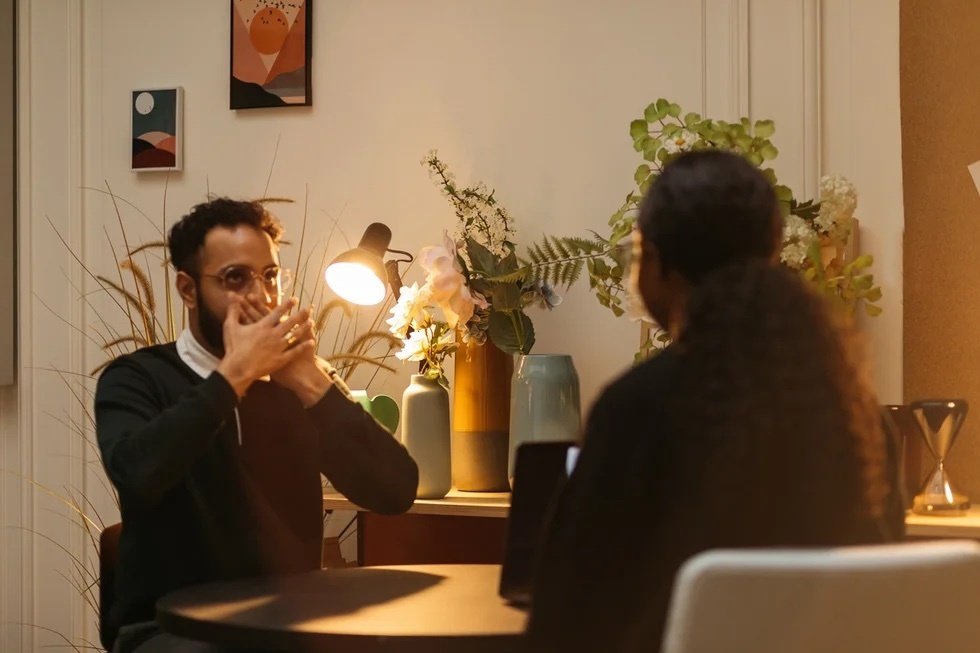Interview faux pas: 10 mistakes you didn't know you were making
Mar 21, 2023
5 mins


Freelance writer and translator, ex-recruiter
Most of us aren’t very good at interviews, or so says Alan Stein, Founder, CEO, and Chief Accelerator at Kadima careers. He should know, he’s had plenty of experience on both sides of the dynamic. The reason? In his words, “There’s a total asymmetry between the experience and power of the interviewer and the interviewee. The whole process is biased and imperfect. It’s actually a very inefficient way of judging talent.”
Stein says that common interview mistakes are made because candidates lack experience and feedback. He likens it to playing tennis: “If you’ve never practiced before, you’re likely to have a lot of unforced errors, and if you practice a lot and go over lots of drills you’re more likely to get the ball over the net in a consistent manner.” So, you see, it’s a question of practice. Stein explains that most interviews are pretty consistent and follow a similar format, meaning they’re easy to prepare for. Do you want to improve your performance at your next interview? Here are the most common interview mistakes to avoid.
1. Being underprepared
Stein says there’s no excuse for not preparing for your interview. “Most interviews have four phases: rapport building, tell me a bit about yourself, questions by the interviewer, and questions by you.” Being unprepared or underprepared for an interview is an easy mistake to avoid.
- Rapport building: This is the introductory small talk—you probably already do this every day.
- Tell me about yourself: This might be phrased as, “Walk me through your resume,” or “What brings you here today.” This is your elevator pitch.
- Questions to you: Prepare for these by looking at the job description. You’ll be asked behavioral questions, case-based questions, and then some random ones. Prepare by matching your experience to the job description and coming up with examples.
- Questions by you: You should always have questions—never say they’ve all been answered. Have at least three good questions ready, but you can adlib based on the conversation if you want to.
2. Being overprepared
According to Stein, “Most interviews happen in rounds, you’ll have an initial interview with a recruiter, then another with a hiring manager and then you’ll make it into the panel or loops.” Overpreparing is a common interview mistake, but what does this mean? Stein says to prepare according to the level of the interview. “For a first round, you want to make sure your LinkedIn profile and resume are on point, know the company’s values so you can reflect on it, find out how they interview, match your capabilities on the job opening, and be able to tell them why you’re so excited to work for them. You don’t want to delay things by taking too long and trying to be perfect.”
This takes us neatly to common interview mistake number 3 …
3. Aiming for perfection
Stein recommends the ethos of How To Stop Worrying And Start Living by Dale Carnegie: Stop worrying about what you can’t control. “If you can control the situation you take the right actions to prepare and be ready. Things that are out of your control, like who you’re competing against, the subjectivity of the interviewer, etc. you can’t control, so stop worrying.” Don’t try to be perfect.
4. Talking about compensation too early
Stein says this one is absolutely key, just don’t go there. “It almost never benefits the individual to discuss compensation early on.” He shares a personal story from getting a job at Google, where he shot himself in the foot and later discovered he could have negotiated a much higher salary. He shared his current salary at an early interview and that created the foundation for the offer. If you’re asked about what your earning expectations are, deflect the question and wait for the offer. Stein recommends saying something like, “You know what, I want to get paid fairly and within the scope of the role.” If they push further you could say, “Well, I’m excited to work for you and compensation’s not going to get in the way.” And finally try, “Oh you know I’m not really sure how you compensate here, can you explain your compensation philosophy to me?” Then ask to get back to them on it once you’ve had time to digest it.
5. Being late or inappropriately dressed for the occasion
Do people really make this obvious interview mistake? The answer sadly is yes. There’s no excuse, just don’t! Dress to impress and respect the interviewer’s time.
6. Being afraid to sell yourself
Whether it’s caused by fear or shyness, not selling your strengths is another common interview mistake. According to Stein, “A job interview is an exercise in personal sales and marketing, it’s ok to embellish and highlight all your best points, do you know a salesperson who doesn’t? One caveat. Don’t lie!”
7. Opting out too early
You might come across a recruiter or hiring manager early on in the recruitment phase who rubs you up the wrong way and leaves you thinking, ‘I don’t want to work for a person or company like that.’ But even if you think you don’t want the role, Stein recommends seeing the recruitment process through. “You might discover something that makes you change your mind, and at the very least you’ll get some interview practice for the role you really want in the future.”
8. Putting all your eggs in one basket
Remember, in an interview, the odds are stacked against you. Even in the last round, you’re competing against at least two other people, so you have at least a 66% chance of not getting the role. Stein explains that if you’re interviewing for jobs, you should always have multiple irons in the fire. You have more chance of success, more leverage to negotiate, and more practice to improve.
9. Not following up
Stein believes this is one of the easiest common interview mistakes to correct and yet so few people do it. Take a few minutes after your interview to send a thank you note. “It doesn’t have to be a handwritten note, a simple email, or a LinkedIn message saying, ‘Hi, it was great to meet you today, thanks for your time,’ will do.” Stein estimates from approximately 2,000 people he’s interviewed only 200 or so have taken the time to do this. Stein shares a tip from Robert Ciadini’s book, Influence, “If people like you they’ll be more inclined to be positive about you when summarizing their perspective on you.”
10. Not reaching out when things go wrong
People are human and life happens. If your kid is sick, your car breaks down, or some other major life occurrence happens to make you cancel your interview, arrive late, or simply have a disastrous experience, Stein recommends reaching out to the company. “Be honest, explain the situation, and if they do give you another chance then be accommodating and make it work.” There’s no guarantee it will work but it’s better than doing nothing.
Key takeaways
Want the Cliff’s notes version of how to avoid common interview mistakes? Here it is:
- Make sure you prepare but keep it in line with the level of the interview: perfection can slow you down and give someone else the advantage.
- Don’t talk about salary until you get the job offer: deflect with clever answers so you can negotiate the best possible salary.
- Always follow up: take a few minutes to thank your interviewer for their time. It makes you likable.
- Know how to sell yourself: nail your elevator pitch and don’t be afraid to big yourself up.
- Don’t fail on something obvious: be on time and dress appropriately to make sure you create a great first impression.
Photo: Welcome to the Jungle
Follow Welcome to the Jungle on Facebook, LinkedIn, and Instagram, and subscribe to our newsletter to get our latest articles every day!

More inspiration: Job interview survival guide
Ace your job interview with our comprehensive guide. From preparing for different recruiters to managing informal moments, our tips and techniques will help you shine.

Beyond the basics: advanced strategies for researching a company before an interview
Want to show off your knowledge and impress the recruiter? Don't skip out on the in-depth researching stage of preparing for an interview!
Mar 29, 2023

People-pleasing in an interview: how a minion mentality can derail your career
"Yep, sure, no problem, I can do that!" People pleasers, beware. Overselling yourself to the recruiter could come back to bite you...
Dec 13, 2022

Interviewing with a friend: the pros, the cons, and how to handle it
Thanksgiving is the perfect time for catching up with loved ones, eating great food, and ... networking?
Nov 22, 2022

The secret art of selling yourself in an interview
Beyond convincing the recruiter your skills and experiences are relevant, you need to be able to sell YOU. A personal branding expert shares his tips.
Nov 10, 2022

8 coaching techniques to prepare for job interviews
Preparing for an interview is much like preparing for a marathon: you need to practice and train your body to perform your best on the day.
Sep 29, 2022
The newsletter that does the job
Want to keep up with the latest articles? Twice a week you can receive stories, jobs, and tips in your inbox.

Looking for your next job?
Over 200,000 people have found a job with Welcome to the Jungle.
Explore jobs